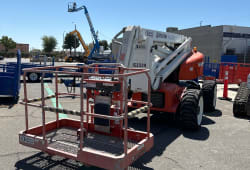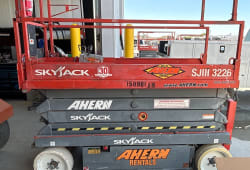How to Choose the Right Heavy Duty Truck for Your Needs
7 Lectura mínima
)
junio 11, 2023
Are you in the market for a heavy-duty truck? Choosing the right one is crucial. A heavy-duty truck is a powerful vehicle designed to tackle demanding tasks. When it comes to heavy-duty trucks, there are several factors you should take into account.
Understanding the different types of heavy-duty trucks is essential. Class 3, 4, 5, 6, 7, and 8 trucks offer varying capabilities. Consider the features that matter most to you, such as engine power and towing capacity.
Fuel economy and comfort are important considerations as well. In this article, we discuss all about heavy trucks. This article will help you how to choose the best heavy-duty for your needs.
Types of Heavy-Duty Trucks
Heavy-duty trucks come in a variety of types, each with its unique purpose. Here are two of the most common types:
Class 3 trucks are the smallest heavy-duty trucks, with a gross vehicle weight rating (GVWR) of 10,001 to 14,000 pounds. They are often used for light construction and delivery.
Class 4 trucks are slightly larger than Class 3 trucks, with a GVWR of 14,001 to 16,000 pounds. They are often used for medium construction and delivery.
Class 5 trucks are the most popular type of heavy-duty truck, with a GVWR of 16,001 to 20,000 pounds. They are often used for heavy construction, delivery, and towing.
Class 6 trucks are larger than Class 5 trucks, with a GVWR of 20,001 to 26,000 pounds. They are often used for long-haul trucking and heavy construction.
Class 7 trucks are the largest type of heavy-duty truck, with a GVWR of 26,001 to 33,000 pounds. They are often used for specialized applications, such as oilfields and mining.
Class 8 trucks are the heaviest type of heavy-duty truck, with a GVWR of 33,000 pounds or more. They are the largest and heaviest type of truck and are often used for long-haul trucking and specialized applications.
These trucks come in a variety of configurations, including straight trucks, tractor-trailers, dump trucks, and flatbed trucks. They are essential for moving goods and materials around the country and play a vital role in the economy.
Features of Heavy-Duty Trucks
Heavy-duty trucks are powerful machines with a wide range of features. Here are the top two characteristics:
Engine power
Heavy-duty trucks are powered by powerful engines that can tow heavy loads and provide plenty of power for acceleration. Gas, diesel, and hybrid engines are all choices.
Towing capacity
The towing capacity of a heavy-duty truck is measured in pounds. The higher the towing capacity, the more weight the truck can tow. Towing capacity is important for people who need to tow large trailers, boats, or other heavy objects.
Payload capacity
The payload capacity of a heavy-duty truck is measured in pounds. The higher the payload capacity, the more weight the truck can carry in the bed. Payload capacity is important for people who need to carry large loads of materials, such as construction supplies or farm equipment.
Fuel economy
Heavy-duty trucks are not known for their fuel economy. However, some models get better fuel mileage than others. Fuel economy is important for people who need to drive their trucks long distances or who are concerned about the environment.
Comfort and convenience features
Heavy-duty trucks come with a variety of comfort and convenience features, such as air conditioning, power windows and locks, and heated seats. These features can make the driving experience more enjoyable and can also help to keep the driver and passengers comfortable in hot or cold weather.
Heavy-duty trucks are powerful, versatile machines that can be used for a variety of tasks. They are a great choice for people who need a truck that can tow heavy loads, carry large payloads, and get good fuel mileage.
Buying a Heavy-Duty Truck
Buying a heavy-duty truck is a big decision. It's important to do your research and find the right truck for your needs. Remember few things are as follows:
How to find a good deal
Do your research: Compare rates offered by various car dealerships and internet merchants.
Consider buying a used truck: Used trucks can save you a significant amount of money.
Look for discounts and incentives: Many dealerships offer discounts and incentives on new and used trucks.
Be prepared to negotiate and Negotiate the truck's cost without hesitation.
What to check while inspecting a vehicle
Check the exterior for damage: Look for dents, scratches, and rust.
Check the interior for wear and tear Look for tears in the seats, cracks in the dashboard, and missing or broken parts.
Take the truck for a test drive: Pay attention to how the truck handles, rides, and brakes.
Have the truck inspected by a mechanic A mechanic can look for any hidden problems with the truck.
How to negotiate the price
Do your research: Know the fair market value of the truck before you start negotiating.
Be prepared to walk away If you're not happy with the price, be prepared to walk away from the deal.
Start by offering a lower price than the asking price: The dealership will likely counteroffer, but you can continue to negotiate until you reach an agreement.
How to finance a truck
Get pre-approved for a loan before you start shopping for a truck: This will give you an idea of how much you can afford to spend and will make the buying process easier.
Compare interest rates from different lenders Interest rates can vary significantly, so it's important to shop around.
Consider a lease Leasing can be a good option for people who don't plan on keeping the truck for a long period. Buying a heavy-duty truck can be a big decision, but it doesn't have to be stressful.
By following these tips, you can find a great deal on a truck that meets your needs.
Most sold Trucks
The Ford F-Series has been the best-selling heavy-duty truck in the U.S. for over 40 years. In 2022, Ford sold over 650,000 F-Series trucks, making it the best-selling vehicle of any kind in the U.S.
The F-Series is available in a variety of configurations, including regular cab, extended cab, and crew cab. It can be equipped with a variety of engines, including a V6, a V8, and a turbodiesel V6. It can also be equipped with a variety of features, including a towing package, a payload package, and a luxury package.
The F-Series is known for its durability, its power, and its versatility. It's a great choice for anyone who needs a truck that can handle a variety of tasks, from towing heavy loads to hauling large payloads.
Here are some of the reasons why the F-Series is the most popular heavy-duty truck in the US:
Durability: The F-Series is built to last. It's made with high-quality materials and it's designed to withstand the rigors of everyday use.
Power: The F-Series is powered by a variety of powerful engines that can handle even the heaviest loads.
Versatility: The F-Series is a versatile truck that can be used for a variety of tasks. It's a great choice for towing, hauling, and off-roading.
Maintaining a Heavy Duty Truck
Heavy-duty trucks are tough machines, but they still need to be maintained. Here are two quick tips to help you keep your truck running smoothly:
Regular maintenance
Heavy-duty trucks require regular maintenance to keep them running smoothly and prevent costly repairs. Regular maintenance includes:
Changing the oil and filter
Checking the tire pressure
Checking the brake pads and rotors
Checking the fluid levels
Inspecting the engine and other components
Repairs and maintenance costs
The cost of repairs and maintenance for a heavy-duty truck can vary depending on the make, model, and year of the truck. However, it's important to budget for regular maintenance and repairs to avoid costly breakdowns.
Insurance
Heavy-duty trucks are often more expensive to insure than other types of vehicles. This is because they are larger and heavier, and they are often used for commercial purposes. It's important to shop around for insurance quotes to find the best deal.
Conclusion
Choosing the right heavy-duty truck is crucial. Understanding different types, like Classes 3 to 8, is essential. Consider engine power, towing capacity, payload capacity, fuel economy, and comfort features.
When buying, research, compare prices, consider used options, and negotiate. Inspect for damage, test drive, and have a mechanic check it. Pre-approval and comparing interest rates help with financing. Regular maintenance, budgeting for repairs, and suitable insurance coverage are important.
Follow these tips to find the perfect heavy-duty truck that meets your needs.

Caleb Woods is an experienced content specialist and an editor at Boom & Bucket, blending his journalism background with expertise in the heavy equipment industry. He delivers engaging, informative content to help professionals stay informed and make smarter decisions in the machinery market.











